Sip Back and Relax: First International Plavac Mali Day Celebrated Today!
September 21, 2021 - Today marks the first official celebration of International Plavac Mali Day! To celebrate this special event, Croatian Premium Wine Imports, Inc. gathered top experts, sommeliers, winemakers, and connoisseurs for a fun online symposium on Croatia's "King of Red Wines". Sip back, relax and have a look into the wine-growing regions, wine industry, and wine tourism of Croatia. Also, don't forget to use the official hashtag #internationalplavacmaliday!
As TCN wrote a week ago, Croatia's gradual rise in the international gastronomy scene allowed more and more people to discover the exceptional quality of Croatian wines, and rightfully so. Thanks to their growing popularity, three international wine days dedicated to Croatian wines came to life this year alone: the International Pošip Day (May 21st), the International Croatian Wine Day (June 25th), and last but not the least, the International Plavac Mali Day (September 21st).
 Photo source: Kyla Ibero
Photo source: Kyla Ibero
TCN was invited to take part in an online symposium on the plavac mali variety, which was initiated by the people who are largely responsible for the undeniable progression of Croatian wines to the international market. The talk was hosted by Mirena Bagur, the Vice-president of Croatian Premium Wine Imports, Inc., and Anna Vidučić, the founder and president of Aroma Wine Co.. Together, they invited participants from all over the world including experts from the Croatian Chamber of Economy, Croatian sommeliers and winemakers, oenologists, wine connoisseurs, and importers.
The talk was conducted the day before the International Plavac Mali Day at 6pm CET and was attended by more than 30 experts in the wine industry. The guests who graced the event with their informative talks on the Croatian wine industry, Plavac mali grape production, and international promotion include:
- Leo Gracin, Doc. Dr. Sc. - Oenologist, Vino Dalmacije winemakers' association president, assistant professor of Meditteranean Agriculture at the University of Split
- Siniśa Lasan - three-time Croatian National Champion Sommelier, Decanter Judge and head sommelier for Rixos Dubrovnik Hotel
- Ivo Jeramaz of Grgich Hills, Napa & Grgić Vina, Pelješac
- Antonija Car-Antunović of Saints Hills Winery
- Marko Šuman of Terra Madre Winery
At the beginning of the symposium, Mirena and Anna delighted us with the story behind the Croatian Wine Alliance. Anna Viducic, a French-born Croatian wine buyer from Paris, found herself in the USA in 1998 after following her passion for the hotel and restaurant business. "I arrived in the US at the time when most people did not even know where Croatia was", she said. Later on, she started to work at a wine magazine. Anna recalled the time when no one wanted to write about Croatian wines but now, according to her, Croatia is a country that is known for its wine and its food culture. Fortunately, she met Mirena who shares her passion for Croatian culture. Eventually, the two decided to team up and promote Croatian wines in the USA and internationally - thus, the Croatian Wine Alliance was established.
Mirena Bagur also said that although Croatia has many wine varieties to offer, they are, at present, focused on promoting wines from the region of Dalmatia because Dalmatian wines such as Pošip and Plavac mali are the ones which are primarily consumed in the USA.
Meanwhile, Leo Gracin, the president of Vino Dalmacije pointed out that in recent years, associations in Croatia have been working hard to accomplish legal and administrative work to secure funding. "Many organizations didn't have funding until recently.", he said. The highly esteemed oenologist on Croatian wine earned his Master's and Ph.D. with a special focus on plavac mali and its polyphenol and aroma content. "When compared to other variety, you will see that plavac mali is really unique. It is the most tannic variety but if it's ripe, it's good. It has perfect acidity", he told the group.
Sommelier Siniša Lasan shares the same opinion on the unique "little blue" grape varieties and their current elevated status on the international market. He also commented that there are a lot of beautiful Croatian rosé wine selections that come from the plavac mali variety which consumers need to try out.
Ivo Jeramaz of Grgic-Vina shared the history of plavac mali which is very significant to their company because it featured his uncle, the legendary Napa Valley winemaker who founded Grgich Hills and also discovered and traced the close relationship between Zinfandel and Plavac Mali, the great Miljenko "Mike" Grgich. Their remarkable story can be read here.
Winemakers Antonija Car-Antunovic of the Saints Hills Winery and Marko Šuman of Terra Madre Winery both talked about wine production and wine-growing region of Pelješač, Istra, and Komarna. According to Marko, Komarna is the youngest wine-growing region in Croatia, and that the region produces the lightest kinds of wines. Meanwhile, the Dingać wine-growing region has always been known over the centuries as one of the best vineyards of Plavac mali variety.
Wine tourism and international promotion of Croatian wines
Nikolina Trojić and Vanja Kaludjer from the Croatian Chamber of Economy were also present in the meeting. They assured us that the HGK is devoted to promoting Croatian wines locally and internationally. On wine tourism, Nikolina commented that Croatia is a relatively small country compared to other established wine countries such as France and Italy and that the already limited production of Croatian wines is largely consumed "by the doorstep" mostly by tourists consumers. According to her, the highly regarded health benefits of the Meditteranean diet and the country's selection of delectable wine varieties are a huge plus for Croatia's tourism sector. She also noted that 47% of Croatian wine production comes from Plavac mali.
The symposium ended with Q&A as leading experts in the wine industry and connoisseurs from all over the world participated. One gentleman from Switzerland asked if Croatia will resume its international Croatian wine campaigns which were previously conducted in Zurich and Geneva a few years back and expressed that he thinks that this is a very important thing for Croatia to do in order to be recognized as a wine country. Vanja Kaludjer, from the Croatian Chamber of Economy, answered that Croatian wine promotions are conducted all over Europe including the USA, Canada, and even China. However, it is basically up to the council of wine associations to decide which country the promotion would take place in and that HGK is not in the position to decide on this matter. He also added that due to COVID-19 and earthquake damages suffered last year and this year, the funding was transferred to crisis measures and housing measures; but rest assured, the Croatian Chamber of Economy is doing its best to resume the international promotion of Croatian wines.
Sam Ramic, the Director of Sales at Wine Worldwide, Inc., commented that if he were to compare the Italian wine industry which conducts hundreds of promotional activities versus Croatia's significantly less number of events per year, Croatia's promotional efforts seem like baby steps. He then proceeded with a very important question: What is the next step to take Croatian wines up a notch? "Now everybody knows Croatia and so I think, we need to push it", he remarked.
Vanja Kaludjer answered, "It's all about the budget for us. We have done many administrative and legislative works in the construction of regional association development and we have resolved a lot of issues with basic financing and legal establishment for the past few years. There are also ongoing projects to promote Croatian wines to foreign markets and also many individual efforts of local wineries, winemakers, and importers are being done."
Leo Gracin also emphasised that the promotion and production of Croatian wines were held back due to the previous problems in organising the associations which have now been fixed. He retaliated, "Now, it is ready for promotion. With better marketing, we can make better results twice. With the newly secured funds, we can get better-protected marks on the bottles. Upon saying that, we have more jobs to do for stronger marketing and obtaining protected trademarks. It will come, I promise you."
Mirena added that associations are finally legally established and can now receive proper funding from the European Union and Croatia. "There is still more work to be done. For starters, importers like us are promoting Croatian wines by selling in other countries.", she said. Mirena also hopes that through the alliance and its member associations, words about Croatian wines will spread fast.
The Q&A portion of the event ended up as a productive open forum on different promotional strategies and limitless possibilities of Croatian wines.
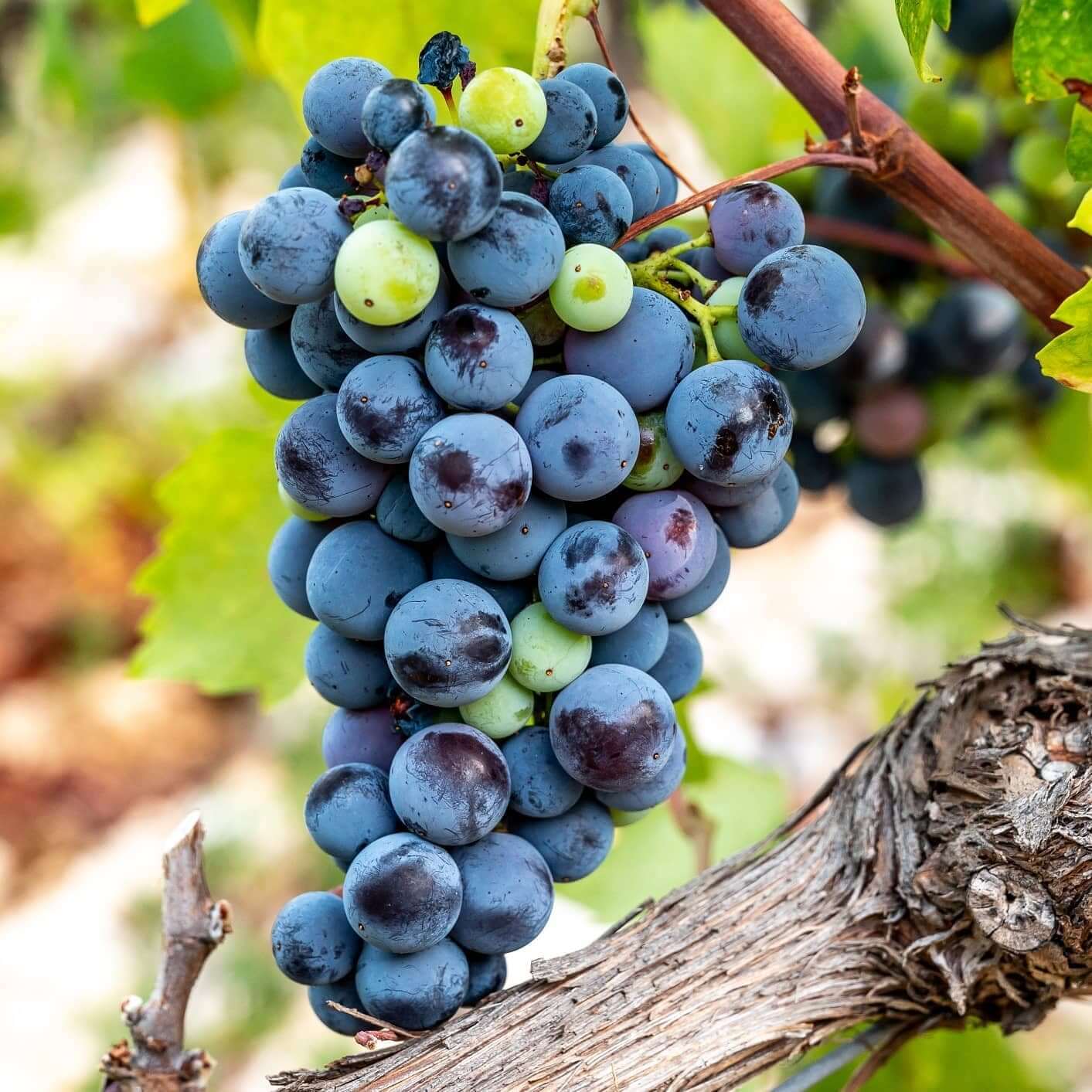 Photo source: International Plavacmali Day Official Facebook Page
Photo source: International Plavacmali Day Official Facebook Page
How to Celebrate International Plavac Mali Day?
- Follow Plavac Mali’s adventures on https://www.facebook.com/internationalplavacmaliday
- Tag that page when you post your own content and use hashtag #plavacmali and #internationalplavacmaliday
- Create your own tastings, wine pairings, giveaways, or educational events – in person or virtually, and tag the social media handles
- Write articles about #plavacmali
- Invite the media to the virtual event on September 20, at noon Eastern time to present Plavac mali and the wine industry in the region. Media can register for the Zoom link, here: http://eepurl.com/hGY1xf
- Encourage others to participate in celebrations.
For more on Made in Croatia, follow TCN's dedicated page.
For more on lifestyle, CLICK HERE.
Find out more on the latest Croatian news.
Verdis Republic: New Self-Proclaimed Neighbour of Croatia
September 20, 2021 - Just like Liberland, another state entity saw an opportunity in unclaimed territories between the borders of Serbia and Croatia. Meet the Verdis Republic.
Despite defending its territory and sovereignty in an armed conflict back in the '90s, Croatia still has some unclear territorial issues.
Back in 2015, a Czech citizen, Vit Jedlicka, used a piece of territory that was claimed neither by Croatia nor Serbia to good use and made himself a president of Liberland.
„We now have 40 future embassies, a working government, a stable source of income through voluntary taxation, and a clear vision about the development of Liberland. I just finished interviews with Huffington Post and Prague Post, so there is a large ongoing interest from people, as well as from the media, in Liberland“, Jedlicka told TCN in 2015.
After only six months of existence justified by the Terra Nullius law (the first person to lay claim to unclaimed sovereign land has rights to it), Liberland allegedly had 300,000 citizenships applications, and Jedlicka granted 130 of them to people who actually managed to come to the territory of the land
„The reason why neither side had claimed the waterfront plot was simple. When discussing borders, Serbia declared it wanted everything to the east of the Danube and had no interest in anything to the west. Croatia, by contrast, wanted to stick to the land register borders of the 19th-century map when the Danube flowed differently. As there was more land on the Serbian side, they laid claim to that, meaning they did not take up any claim on what was soon to become Jedlicka's Liberland“, explained Paul Bradbury in 2019 when he wrote about four years of Liberland's existence.
But as the Liberland territory isn't the only no-man's land around the Danube region, a new state most recently wants to get the land for itself.
„Verdis, officially the Free Republic of Verdis, is a sovereign-state claiming an uninhabited parcel of disputed land locally named as pocket 3 of the Croatia-Serbia border dispute on the western bank of the Danube, close to 'Liberland', between Croatia and Serbia. It plans to be a largely environmentally conscious and humanitarian state in Europe. The Free Republic of Verdis is currently aiming for international recognition and a permanent inhabitance on its land claim. With Verdis being the first entity to lay claim to its land-claim, it makes the land-claim legally belong to Verdis even after the Croatian-Serbian border dispute ends. This is due to international law“, says the website of the new neighbor to Croatia and Liberland.
Verdis currently only exists as a website (which tries to get as much attention as possible by contacting various news outlets such as Večernji List) but already has 1,040 citizens. Most of them are Croats and Serbs. So far, nobody lives in the territory, but there are already big plans and ideas of how the state will function.
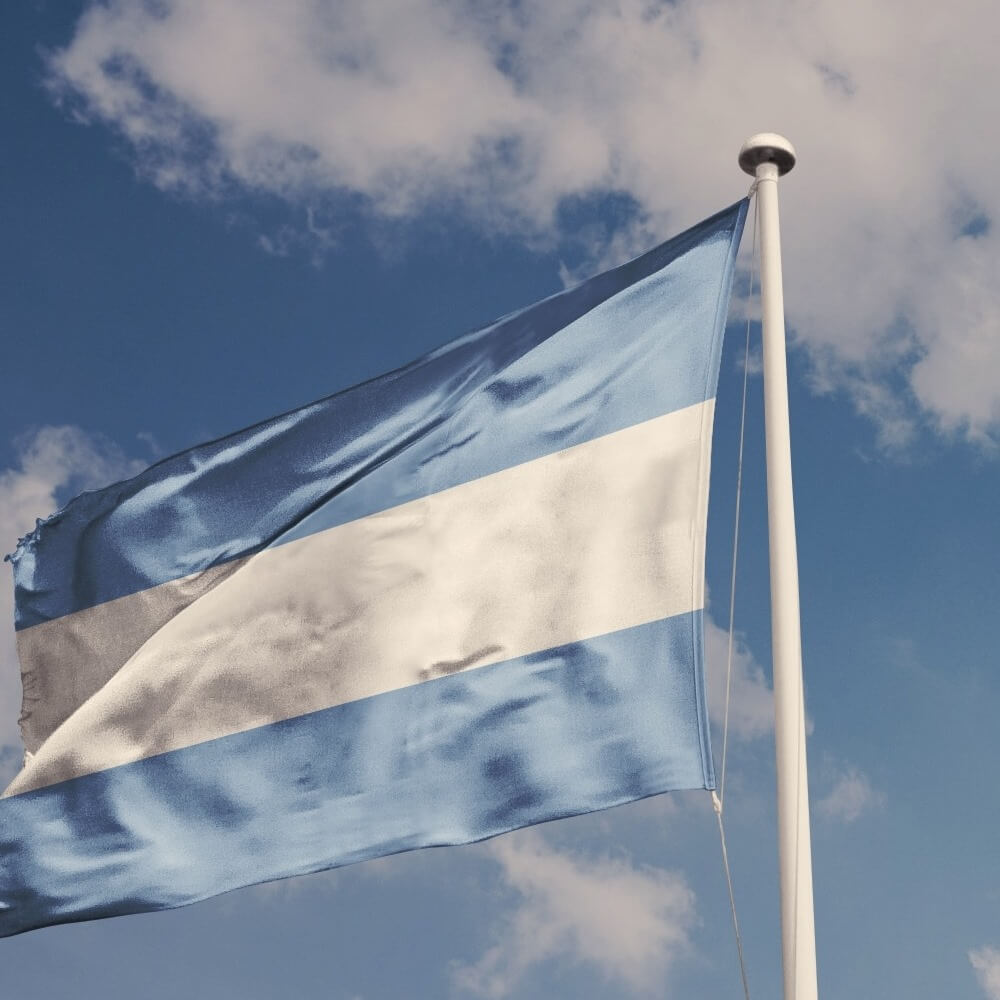
Verdis Flag © Free Republic of Verdis
„The population of Verdis is to be divided into Representative groups, each of these groups will have 150 people in them, and there will be 100 groups in total. Every two years a representative elected by their group will sit at the House of Representatives. Here laws and regulations are voted upon. Laws that a majority of the House of Representatives agree to pass are sent to the President to sign. If the President signs the proposed law it will come into effect. If the president does not choose to sign the law, the House of Representatives might have to change parts of the law or persuade the President to pass it“, says the Verdis website.
With the plan so far, Verdis will have 13 ministries and the department of the president. As Večernji List learns, the current president is Daniel Jackson, who, despite the fact you can't vote until you are 18 neither in Croatia or Serbia, is currently 16.
„16-year Daniel Jackson that presented himself as a temporary president hopes that in five to ten years, Verdis will achieve international recognition and have enough money to settle on territory which he claims permanently“, says Večernji List. They add that in order to get citizenship, you need to pay 16 dollars. Jackson also told Večernji List that he has never been to the Verdis territory so far, only negotiated to sail through Dunav, but that the coronavirus pandemic slowed down the whole thing. He also pointed out that all his current endeavors are done with respect to international law. Verdis has also issued several passports.
The aforementioned environmentally conscious republic has several ideas on how to make this new country eco-friendly right from the start.
„The Government of Verdis has shown increased interest in establishing hydroelectric whirlpools. Although these HW's are small, a single one can power up to 60 homes. They are small, cheap, easy to manage, and are harmless to the environment. This is the most positive plan for Verdisian electricity. As it will take time for Verdis to establish its self-sustained electricity, the government plans to rely on neighboring sovereign-states by paying for essentials until further established“, says the Verdis website.
They add that buildings themselves will be done in a modern and environmentally-conscious design. They will be built as high-rises to ensure more space on the ground.
„This will allow a large population in such a small area while also allowing a normal and decent life in such a small area similar to Monaco“, the new government promises as the president collects money to actually come and visit his country to be.
Pupil Back to School With Mask, Ending Two-Week Absence Over Face Mask Row
ZAGREB, 20 Sept 2021 - An eighth-grader from the Krapinske Toplice elementary school came to school wearing a protective mask on Monday morning, thus ending his two-week absence caused by his parent's decision to defy the face mask rule.
"The boy resumed attending classes, and e entered the school building, wearing a protective mask while being in the hall", the school's headmaster, Samson Štibohar, told Hina.
At the beginning of the new school year, the father of this eighth-grader had claimed that his child could not wear the protective mask. The rule applies only in common areas of the school building in this northern Croatian town.
The father and several people who supported him held a protest rally on 10 September outside the school and later raided the school building. The police responded to the unruly rally and filed reports against some of the demonstrators.
After that, the headmaster and local employees of the social welfare center held talks with the parents, and the headmaster said today that the only thing that was important was that that the student was back in school.
"We achieved an agreement that it is essential for the student to resume his classes as usual", Štibohar said.
For more, make sure to check out our dedicated lifestyle section.
Božinović: COVID-19 Team Not Considering Tightening or Relaxing Restrictions
ZAGREB, 20 Sept 2021 - Minister of the Interior Davor Božinović said on Monday the national COVID-19 response team was not considering either tightening or relaxing epidemiological restrictions, such as the reopening of nightclubs, and that the protest against those restrictions held on Saturday was unjustified.
"At the moment we are not planning any tightening of the restrictions or their further liberalization," Božinović, who heads the COVID-19 response team, told reporters in Šibenik when asked if the reopening of nightclubs was being considered, as demanded by bar owners on Sunday.
He noted that it was not necessary to explain in great detail why nightclubs would not be allowed to reopen even if complying with anti-epidemic rules, including COVID-19 certificates.
"After 18 months of the pandemic, everyone will tell you that indoor areas are the main problem if they are not aired sufficiently and if people do not keep at least a minimum physical distance from one another," he said, stressing that gatherings at nightclubs were more difficult to control than gatherings at football matches.
No reason for the protest
Commenting on a protest against epidemiological restrictions, held in Zagreb on Saturday, Božinović said the protesters had gathered without any real reason.
"After the protest, at least some of them probably went to a cafe or a restaurant and were probably mad because they protested without any real reason," he said, adding the organizers had rushed to "stage something" after seeing scenes of protests in Europe and elsewhere in the world.
The minister also said that he did not know if police had acted after Parliament Speaker Gordan Jandroković had reported a person to them, who called him by the nickname 'Njonjo' (Wuss) in a phone conversation.
"It is normal for a protected person who gets a call from an unknown number to tell their security that they received a call from an unknown person who had insulted them. The protocol about that is clear... there is staff who take care of that," said the minister.
"I do not know if the police did anything, but I'm sure that everyone in that chain did what they were supposed to do," he said.
Božinović also commented on the lifting of visa requirements for Croatian nationals traveling to the USA, saying that after a long-lasting process he was an optimist. He expressed hope that Croatians would be allowed to travel to the USA without visas by the end of the year.
For all you need to know about coronavirus specific to Croatia, including travel, border, and quarantine rules, as well as the locations of vaccination points and testing centers across the country, make sure to bookmark our dedicated COVID-19 section and select your preferred language.
Civil Protection Croatia: Conference on Crisis Efficiency Held in Vinkovci
September 20, 2021 - A civil protection Croatia conference titled "Civil Protection and City Security" analysed the response to the pandemic and the 2020 earthquakes in the country. Could the European PRAETORIAN Project make things better?
The pandemic and shocking earthquakes in 2020 showed in the most painful way possible how important civil protection is and how much Croatia still has to learn. That sais, there is no place for sorrow, as these topics now get more and more attention in public and relevant actors are on the go.
Earlier in September, the small but sweet town of Vinkovci in Slavonia was hosting the “Civil Protection and City Security“ conference to assess and address the relevant issues of civil protection. The conference organised a panel on the topic of civil protection and crisis management in which Krešimir Kuk (from the Croatian seismological service), Dragutin Repinc (from the Croatian War Veterans Ministry), Siniša Petkoviček (from the Croatian Firefighters' Community/HVZ), Davor Spevec (Civil Protection), Pavo Medved (Vukovar-Srijem County) and Josip Granić (the director of the Croatian Mountain Rescue Service/HGSS), all took part.
In her opening remarks, Nataša Gajski Kovačić noted that the biggest problem in civil protection back when 2020's earthquakes struck was segments of systems being uncoordinated. The positive side, however, was the HGSS' level of efficiency in earthquake-damaged areas, rapid entrance to damaged sites, finding injured people and bodies, as well as the very quick organisation of help in removing dangerous parts of buildings and information distribution. This shouldn't come as a surprise with HGSS already being a very well loved and respected institution in Croatia.
The institution is respected both for its professional and efficient rescue missions and their edgy sense of humor as HGSS often posts sarcastic remarks to tourists who get in trouble while exploring Croatian mountains and nature without taking precautions. TCN had the chance to interview Josip Granić two days after the devastating earthquake in Petrinja at the very end of 2020.
The second day of the two-day conference moved from discussions to more specific plans of action when the ''Smart City and Crisis Management'' part presented the PRAETORIAN Project. Being an acronym for ''The protection of critical infrastructure from advanced combined cyber and physical threats'', the project's strategic goal is to increase the security and resilience level of critical European infrastructure (CI), facilitating coordinated protection of interrelated physical and cyber threats.
''The project will specifically tackle (i.e. prevent, detect, respond and, in the case of a declared attack, mitigate) human-made cyber and physical attacks or natural disasters affecting CIs. It will also address how an attack or incident in a specific CI can jeopardise the normal operation of other neighbouring/interrelated CIs, and how to make all of them more resilient by predicting cascading effects and proposing a unified response among CIs and assisting first responder teams. PRAETORIAN is a CI-led, user-driven project, which will demonstrate its results in three international pilot clusters. Some of them cross borders, involving 9 outstanding critical infrastructures: 2 international airports, 2 ports, 3 hospitals, and 2 power plants“, says the European Commission's website.
France is busy coordinating this project which started back in June and will last until the end of May 2023.
HGSS is, along with Zagreb Airport and the well known Croatian company Končar, one of the partners on the project.
With the hopes that the PRAETORIAN Project will help boost Croatian CI, making cities safer and more resilient to earthquakes various other threats, it's worth noting that Croatia already does enjoy a reputation for handling things well and insisting other countries solve their own problems. Look no further than smoke and fire - literally. Not only has Croatia learned how to handle its own troubles with wildfires, but it also helps others to do the same. Just this year, but Croatia sent its firefighters to assist Turkish colleagues and also sent several firefighting planes to Greece — earning international respect and expertise acknowledgment.
Not far from Vinkovci is Vukovar, and you can learn more about Croatia's Hero City in our TC guide.
For more about the Croatian Mountain Rescue Service, follow TCN's dedicated page.
Minister Says Croat Expatriates in USA Croatia's Unofficial Promoters
ZAGREB, 20 Sept 2021 - Croats in the United States contributed to Croatia's international recognition and are today its unofficial promoters, Croatian Foreign Minister Gordan Grlić Radman said in New York on Sunday, after meeting with members of the Croat expatriate community.
"The Church of Saints Cyril and Methodius here is headed by the Franciscans from Herzegovina, and the Croatian school here brings together already the third generation of U.S. Croats," Grlić Radman said, noting that this bore witness to a wish to preserve one's national, cultural and linguistic identity.
Croats "have given a major contribution to the prosperity of the U.S. society, without forgetting their own roots," he said, adding that Croat expatriates were unofficial promoters of their country, having advocated Croatia's recognition and "spreading the truth about Croatia's struggle for freedom against the Great Serbian aggressor."
The minister said that Croat expatriates in the USA had helped Croatia politically as well as by sending humanitarian assistance.
He recalled that in 2020 the Croatian government initiated an amendment of the citizenship law to make it easier for "all descendants of the Croat people" to obtain Croatian citizenship.
Asked about former president Kolinda Grabar-Kitarović's having joined President Zoran Milanović's delegation on a visit to the United States for the ongoing 76th session of the UN General Assembly, Grlić Radman said that he supported "everything that is aimed at promoting Croatia's national interests."
Grlić Radman is visiting the USA from 19 to 25 September.
For more about the Croatian Diaspora, visit our dedicated page here.
Ombudswoman Calls on Split City Authorities to Honour Its Para-Athletes
ZAGREB, 20 Sept 2021 - Ombudswoman for Persons with Disabilities Anka Slonjšak has called on the Split city authorities to honor local athletes who have won medals at the Paralympic Games by inscribing their names on the Split Sports Walk of Fame, thus showing that persons with disabilities are accepted and equal to other members of society.
The western section of the city's waterfront, upgraded in April 2013, includes the Sports Walk of Fame featuring bronze plaques with the names of 76 Split athletes who have won 94 medals in 11 events at the Olympic Games, starting with the 1948 Olympic Games in London.
Slonjšak noted that by symbolically honoring Split para-athletes by inscribing their names on the Sports Walk of Fame the city authorities would send an important message - that persons with disabilities are accepted and have equal rights as other members of society.
To learn more about sport in Croatia, CLICK HERE.
Milanović: Croatia Very Safe Country, Has Never Been Stabler
ZAGREB, 20 Sept 2021 - In an address to members of the Croat expatriate community in New York on Sunday, Croatian President Zoran Milanović said that Croatia "is a very safe country" and that it had never been stabler as well as that it was responsible for its neighborhood staying safe as well.
Milanović arrived in New York on Sunday to attend the 76th session of the UN General Assembly, during which he is expected to hold several bilateral meetings, including with Turkish President Recep Tayyip Erdoğan.
On the first day of his visit, Milanović met with representatives of the Croat community at the St. Nikola Tavelić Centre, which is part of the Parish of Saints Cyril and Methodius and St. Raphael, and in his address to them, he said that he was more interested in developments in Croatia and its neighborhood than in topics to be discussed by the UN General Assembly.
"I cannot do a lot, but being President, my voice in the region is heard, analyzed, and criticized, and I will go on," Milanović said as quoted by a statement from his office.
He said that he was dissatisfied with developments in the region, describing Croatia as the most rational stakeholder.
"Fortunately, this is no longer 1990, there is no danger of a serious conflict erupting. But we must follow what is happening in our neighborhood, and people there have been behaving as if war did not happen and no lessons were learned from what happened in the 1990s."
"In all of that, Croatia and the incumbent government, I as President, and my predecessor are the calmest, most conciliatory, and most rational. We are responsible for keeping the region peaceful, safe, and for life in Croatia to stay normal and safe. Croatia is a very safe country," he said.
Despite disagreements on a daily basis, Croatia has never been stabler, Milanović said in his address.
He also again underlined the importance of Croatia making the most of the benefits of its EU membership and fighting for its own interests and repeated his position on COVID-19, calling for lifting epidemiological restrictions.
For more on politics, follow TCN's dedicated page.
Zagreb Mobility History: Enjoy Cipelcug Through Past Exhibition
September 20, 2021 - Are you curious about Zagreb mobility history? Head on over to the Zagreb City Museum, learn about it and see how Zagreb's citizens moved around and exercised as the capital of Croatia honors European Mobility Week.
Cipelcug, which is a bit of an outdated but still quite distinct word from Zagreb's own jargon, is a term used for walking and being a pedestrian.
With the word being more commonly used in the historic days of Zagreb's city life, it is only right that the programme ''Cipelcug Through The Past“ which deals with the historical development of Zagreb's transportation, carries such a name. The programme hosted by the Zagreb City Museum (MGZ) already kicked off Saturday, and this Wednesday, September 22, at 11:00, another day of this event is set to take place.
MGZ invites everyone to walk to the museum up in Upper town (Gornji grad) and enjoy the thematic tour looking into the history of Zagreb's public transportation and other ways of moving through the city. In addition, an expert from the Medveščak Sport and Recreation Society will demonstrate how people exercised in the past.
The demonstration will be followed by an opportunity for the visitors to try out some antique exercise props themselves. Participation is free, and you can also look at the permanent exhibition of the museum that stores relics of the earliest human activities in Zagreb's territory, leading all the way up to modern times. This includes, as TCN previously wrote, the display of three previous cannons that took the duty signaling noon for Zagreb's residents before being replaced by today's cannon from the 80's.
The ''Cipelcug Through The Past“ programme is organised to honor and contribute to European Mobility Week (September 16-22), and on a local level, it is part of a ''Safe and Healthy with Sustainable Mobility'' initiative, coordinated by the City of Zagreb.
The City of Zagreb first took this initiative with the World no Car Day back in 2001 and for the past 20 years, it has organised a week-long streak of activities which makes Zagreb a ''Golden participant'' in the eyes of the international community.
''The selection of this year's theme honors the difficulties both Europe and the world witnessed during COVID-19. It celebrates the resilience of cities and their achievements in trying to preserve the momentum. It also reflects the possibilities of changes that come from this public health crisis which has been unseen in Europe until now,'' says the City of Zagreb's official website.
For its efforts in promoting carless mobility and the rich content of its events, Zagreb won the Mobility Award back in 2012.
Learn more about Zagreb on our TC page.
For more about culture in Croatia, follow TCN's dedicated page.
Help Create Affordable Rimac Nevera: Vote for the LEGO Version
September 20, 2021 - Fancy owning a Rimac Nevera, but a few dollars short of the asking price? Help create the budget version, powered by LEGO.
When I was growing up back in the 15th century, LEGO was king. Simple blocks to build, a chance for childish creativity. I would play for hours.
There were no distractions of gadgets or the Internet back in those days, and the simple LEGO pieces, which all came in standard sizes, were popular with kids everywhere.
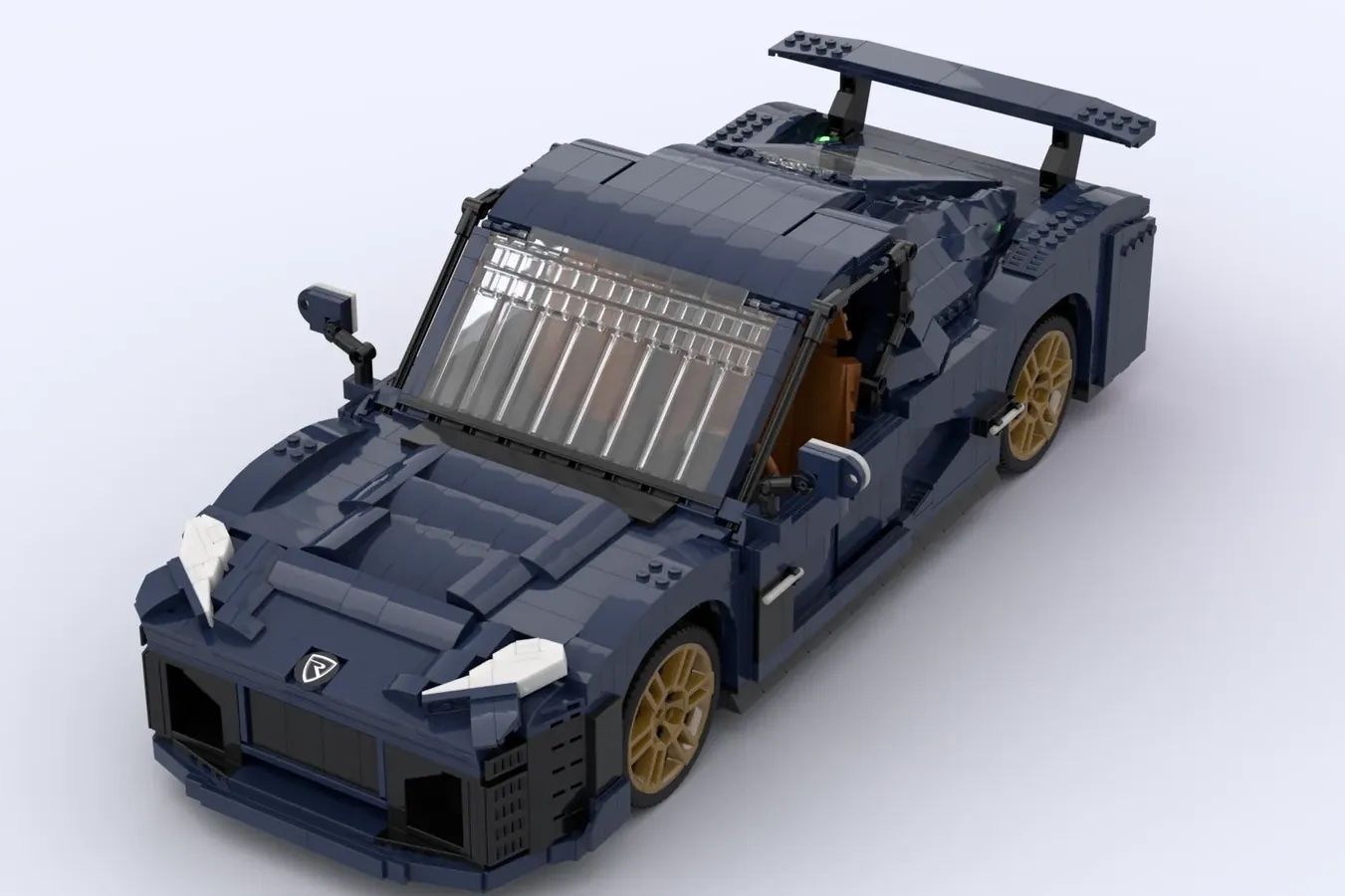
About 10 years ago, I was looking for gifts for my nephews on a trip back to the UK. I was heartened to hear that they were into LEGO, with a special interest in Star Trek and Star Wars. I was admiring their creativity in my head - just how would you build the Starship Enterprise from those simple blocks - until I went into the story. LEGO had clearly moved on, and I left a few minutes later with some custom-made inter-galactic LEGO sets.
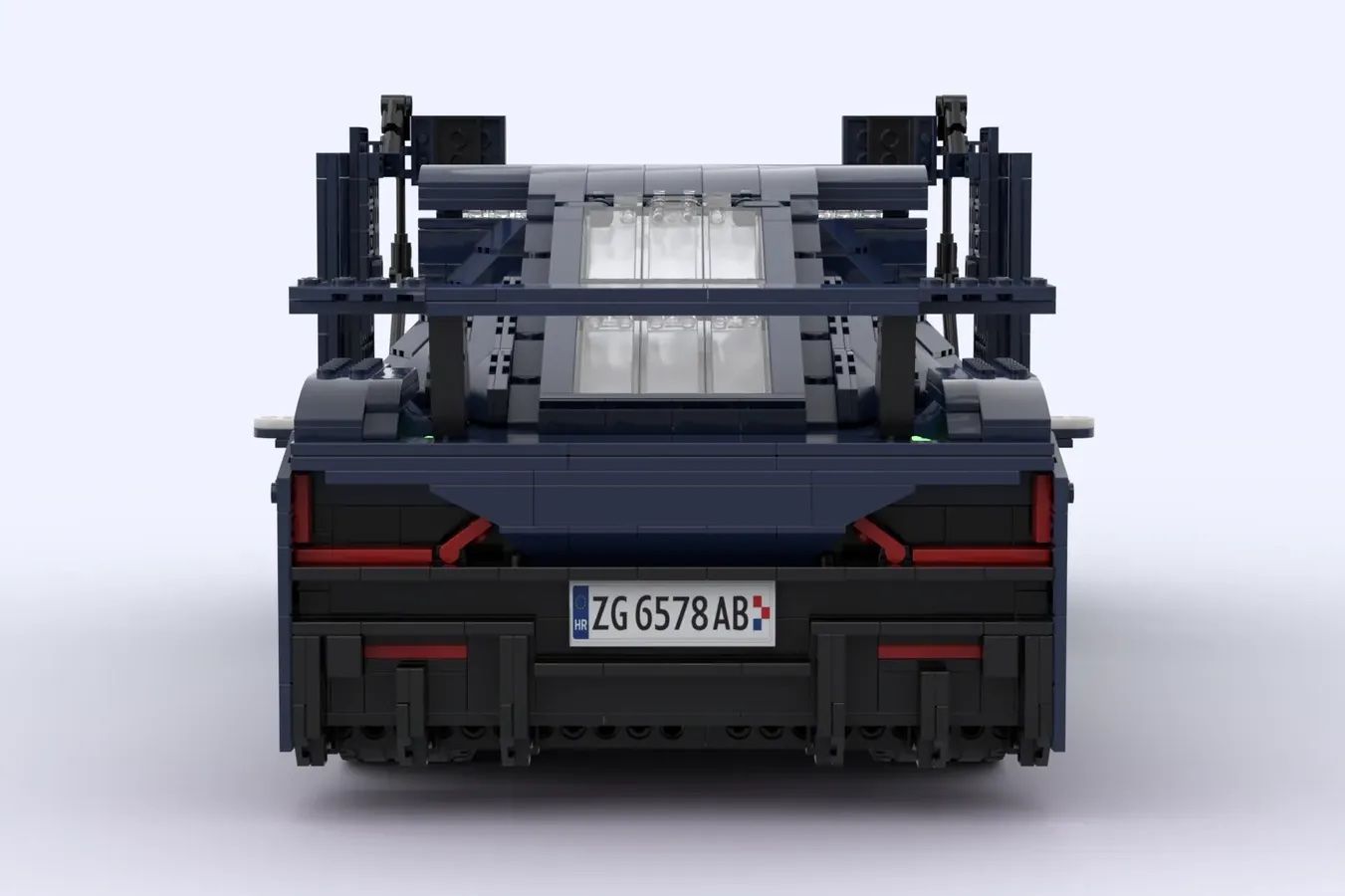
And not only is LEGO still thriving, but it is also evolving. One of its coolest features is to encourage innovation in new models. The company encourages its customers to design new products using LEGO pieces, and if there is enough interest (10,000 votes), then the company will consider putting the design into mainstream production.
This initiative takes some serious planning and dedication for those with a passion, and TCN has featured a couple of designs before. But could this be the ultimate cool LEGO gift for your nephew or niece, a gift to inspire for the future. Meet the proposed LEGO version of the Rimac Nevera!
It is all the brainchild of a fan called platon_dr who tells us a little more about the proposed LEGO version on the official LEGO website:
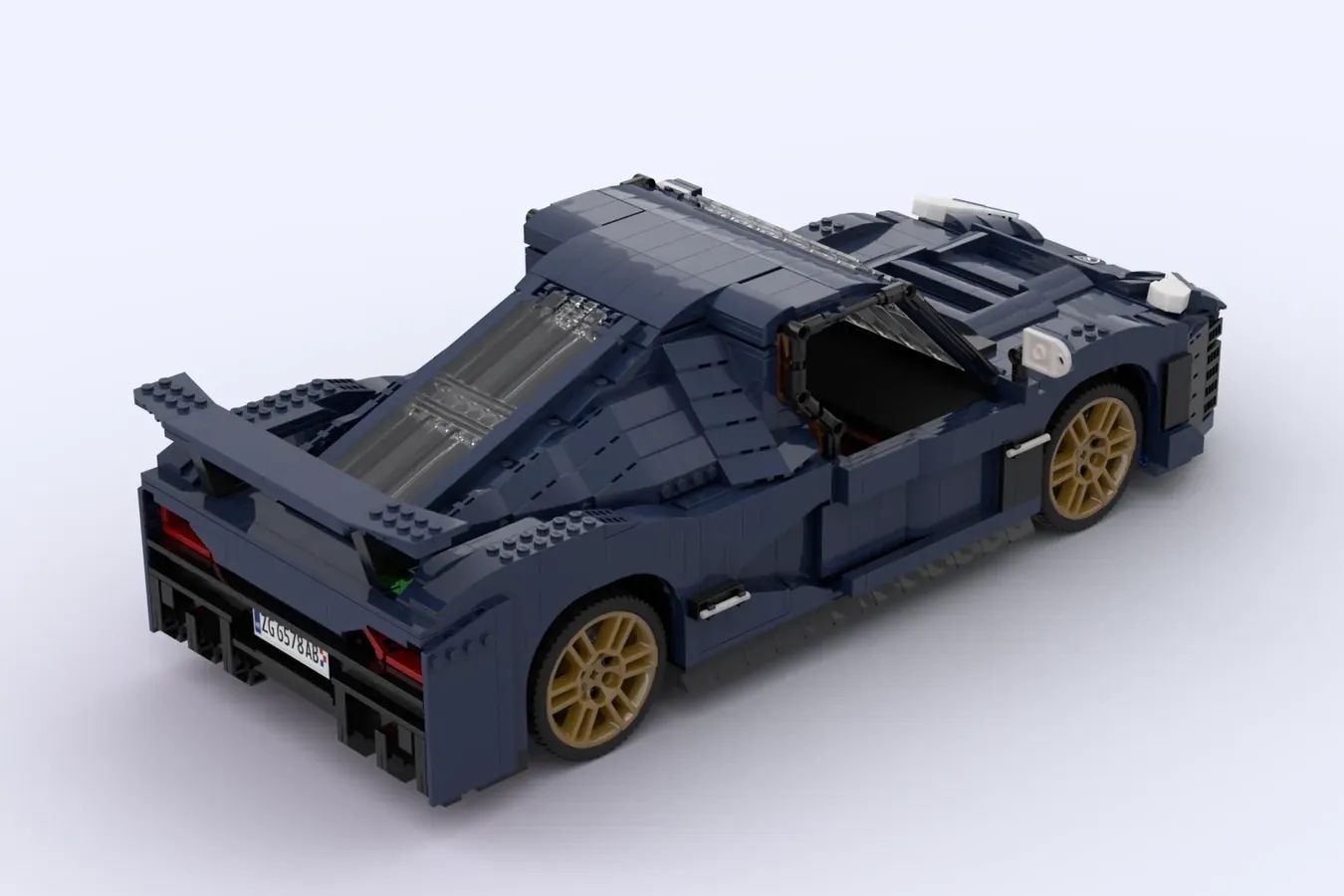
The model itself consists of 2127 parts, has an opening boot, doors and several compartments in the interior.
There is no frunk, just in like the real car, all the space in the front is used for making the car faster, than any car before had ever been.
The interior is very accurately copied, there are several opening compartments, the butterfly doors open just like the real ones, except they’re a bit smaller.
I must confess that my first reaction to seeing the Rimac Nevera was 'wow!' But platon_dr had another reaction:
The second I saw the car, I thought to myself “this would be a pain to build out of LEGO” and then I took it as a challenge. It would make a great set as LEGO also has to move on into the electric car future.

(The real thing - photo by Rimac Automobili)
Want to help make the budget Rimac Nevera a reality? You can voice your support for the idea here.
Alternatively, go for a spin with one of the first buyers of the Rimac Nevera, Formula One legend Nico Rosberg.
For more Croatian innovation, check out the TCN Made in Croatia section.


